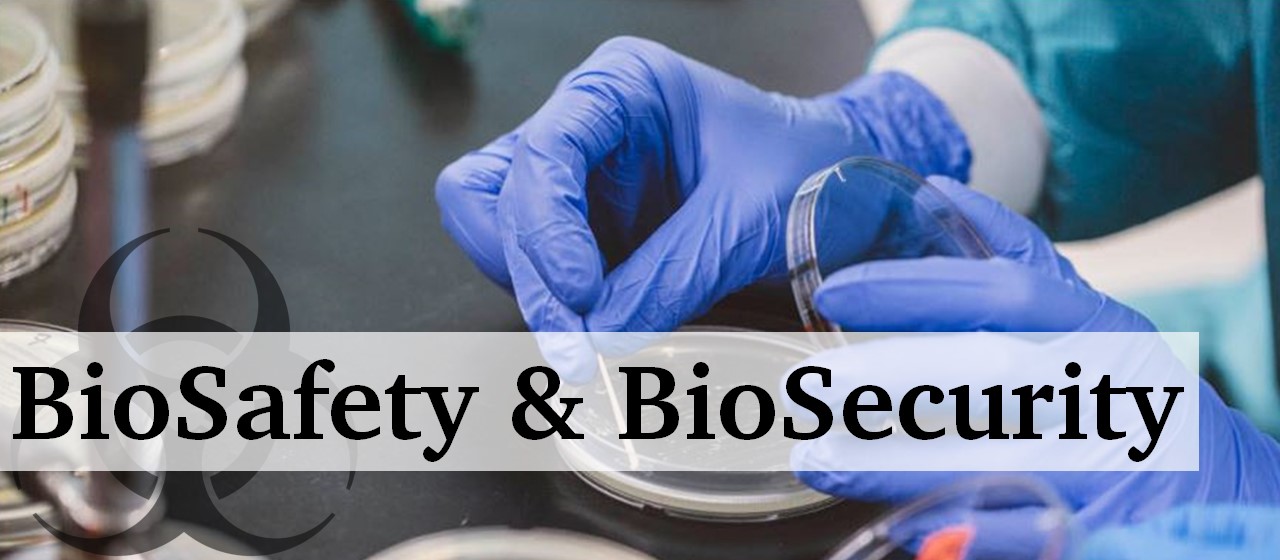
Work with microorganisms, recombinant/synthetic nucleic acids, human and animal materials, insect and animal vectors, and other potentially biohazardous materials is necessary in many university research and teaching applications and requires special practices and procedures, and in some cases, special equipment to protect personnel and the environment.
Texas Tech University is actively committed to preserving the health and safety of its students, staff, and faculty and to protecting the environment and surrounding community. The Department of Environmental Health & Safety provides guidance regarding the assessment, containment, and security of biological materials that complement the institutional operating policies which support compliance with the guidelines, recommendations, and regulations applicable to such work.
Biosafety News & Updates
NIH Biosafety Modernization Initiative
The NIH plans to have the draft of their new biosafety oversight policy ready for public comment in spring of 2026 with the final policy published in fall 2026. The public can submit written comments directly to the NIH through the widget below. Specifically, the NIH is seeking insight regarding the following:
- The utility of agent risk groups (as outlined in the NIH Guidelines) in determining appropriate containment for specific experiments.
- The levels of oversight that should be required under the policy and what categories of research should fall under those levels based on risk and safety data.
- Opportunities where expedited review would be appropriate and what types of research would fall into such a level.
Recent changes to Biosafety Policy at TTU
Due to a change in state regulations, those using human materials collected post-mortem must be certified with the Texas Funeral Service Commission. Please see the Human & Non-human Primate webpage for details regarding this process.
Cayuse Resources
The IBC Office has developed a Researcher Toolbox and a Cayuse FAQ page to assist you in completing your IBC protocol in Cayuse.
Resources & Links
CDC-Biosafety in Microbiological and Biomedical Laboratories 6th ed.
NIH-OSP Division of Biosafety, Biosecurity, and Emerging Biotechnology
Federal Select Agent Program - Guidance Documents
Pathogen Safety Data Sheets - Health Canada
American Biological Safety Association - ABSA International
OSHA Bloodborne Pathogen Standard
Texas Department of State Health Services - Bloodborne Pathogens
Model Bloodborne Pathogen Exposure Plan
Safely doffing gloves - "Beaking" Method
Biosafety Topics
The links below provide specific information about the BioSafety & BioSecurity Program at Texas Tech.
Academic Safety ResourcesAnimals & Animal Materials
Arthropods & Vectors
Biological Risk Assessment
Biosafety & Biosecurity Home Page
Biosafety Cabinets and other Engineering Controls
Biosafety FAQs
Biosafety PI Responsibilities
Biosecurity
Biowaste Management
BUGs (Bio-material Use Guides)
Clinical Biosafety
Decontamination
Emergency Response
Human & Non-Human Primate Materials
Laboratory Self-Survey
Microorganisms
Occupational Health Program (OHP)
Personal Protective Equipment (PPE)
Plants
Prions
Recombinant/Synthetic Nucleic Acids (r/s NAs)
Standard Operating Procedures (SOPs)
Toxins of Biological Origin
Transporting Biological Materials
IBC Resources

Researcher Toolbox (Forms & Guides)
IBC Protocol Registration Process
Cayuse FAQs
Cayuse Personnel Registration
DURC-PEPP
IBC Minutes
Environmental Health & Safety
-
Address
Texas Tech University, 407 Flint Ave, Lubbock, TX 79409 (Mail Stop 1090) -
Phone
806.742.3876 -
Email
safety@ttu.edu

